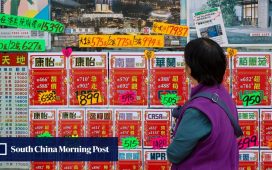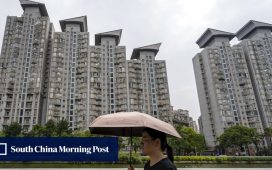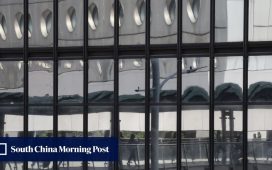The Hong Kong retail property market could tap a new wave of demand from Chinese electric vehicle (EV) makers rushing to set up showrooms and related infrastructure, as the city pushes ahead with its aim to be carbon-neutral by 2050.
On Tuesday, Denza, the luxury EV brand owned by BYD, rented a 14,000 square feet showroom in Wan Chai at an annual rent of over HK$1 million for a three-year term, according to property consultant Jones Lang LaSalle.
The brand opened its first flagship store in Hong Kong at Kowloon Bay on last week and received more than 10,000 orders on its opening day, Zhao Changjiang, the general manager of Denza sales division, said in a social media post.
AION, the EV brand owned by Guangzhou Automobile Group, inaugurated a showroom in Sha Tin on June 15 and unveiled plans for two additional stores and after-sales centres in Hong Kong.
“We can see a trend where many EV makers from mainland China are setting up showrooms in Hong Kong, as the city’s EV adoption gathers pace and given its proximity to the Southeast Asia market,” said Lucia Leung, the director, research and consultancy for Greater China at property consultancy Knight Frank.

Related facilities such as workshops and warehouses for repairing and assembling EVs could also drive demand for retail space, Leung said.
“Some EV brands may not just set up conventional showrooms on the streets,” she said, referring to those on Gloucester Road, Wan Chai and Kowloon Bay. “Some of them now go into shopping malls and set up experimental showrooms that encourage customer interaction. So this also drives the demand for retail space.”
However, doubts swirl if this new source of demand will reinvigorate Hong Kong’s retail property market after its multi-year decline trajectory.
Hong Kong’s private retail indices dropped by an average 9.5 per cent in 2023 from 2019 while average selling prices slumped 12.6 per cent in that same period, according to the government data.
Oliver Tong, the head of retail at JLL, said although Hong Kong is an ideal city for EV makers because of its international finance centre status, the market size may be insufficient to boost the retail property market.
“Since most EV makers are not looking for space in prime districts in Hong Kong and their footprint is not very large as a whole, their showrooms may not be big enough to save the market,” said Tong.
Knight Frank’s Leung said these companies are likely to choose locations such as Denza’s operations in Kowloon Bay, to be closer to their peers.
BYD set up a service centre in Kowloon Bay last year and AION has also built a showroom in the area, according to the JLL.
Tong said more EV makers are likely to come to Hong Kong over the next two to three years and the government is rolling out infrastructure in anticipation of increased demand.
Hong Kong can also develop space to set up battery switching workshops and follow Nio’s example on mainland China, Tong said.
Government data showed that even though the number of charging piles in Hong Kong rose 39.5 per cent to 8,056 in 2024 from a year ago, it will be insufficient to service Hong Kong’s current fleet of more than 90,000 EVs, which is growing.
Leung said the government had offered tax rebates for EV buyers and could unveil more incentives to increase the demand for EVs in future.
“The Hong Kong and Macau markets are a good window to test the product competitiveness of right rudder cars, and we are striving to enter the Southeast Asia market,” said Mars Chen, the vice-president of Zeekr, in a statement to The Post. “We have opened our first showrooms in Wan Chai, and we will open more stores to meet the customers’ needs in Hong Kong.”
Additional reporting by Daniel Ren







